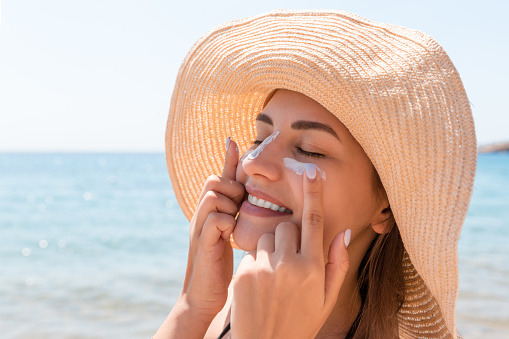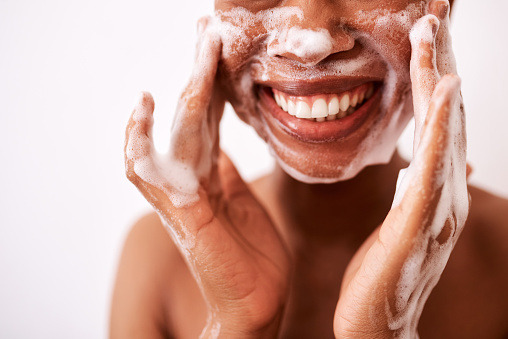Acne, or pimples, is a common skin problem, especially among those with a combination or oily complexion. Acne breakouts may occur due to a number of environmental factors, a poor skincare routine that irritates and clogs the pores, a hormonal imbalance, excessive stress, or in some cases, they can be triggered by certain types of food. Pimples can pop up anywhere on the skin, but they most often appear on the face. While there’s no surefire way to prevent them, there are many ways to reduce their severity and keep them from spreading. On that note, here are some of the easiest, most effective ways to keep your acne in check.
Wash Your Face Twice a Day
To prevent pimples from spreading, you need to remove oil, dirt, and sweat by washing your face twice a day. Be sure to scrub your skin gently in circular motions. You can use your fingers or an exfoliating glove, but don’t use harsh cleansers to avoid irritation or dryness. Wash your face with warm – not hot – water, rinse thoroughly, and pat it dry with a clean, soft towel.
Use OTC Acne Treatments
Many over-the-counter (OTC) treatments can help clear pimples quickly or prevent them from breaking out in the first place. Most of these products contain ingredients that clear your pores, kill bacteria lurking underneath your skin, and give you a smooth complexion, such as salicylic acid, benzoyl peroxide, or lactic acid. To prevent irritation, redness, dryness, and other side effects, follow the recommended usage instructors and use OTC acne treatments with caution if you have sensitive skin.
Moisturize Regularly
Many acne products, OTC or otherwise, tend to dry out the skin, which is why you need to moisturize any acne-prone area regularly. Use an oil- and fragrance-free moisturizer to keep your skin hydrated and minimize skin peeling, but be sure to pick one that is specifically formulated for your complexion. To make sure that it will not block your pores, look for one with “noncomedogenic” on the label.
Wear Less Makeup
It’s tempting to use makeup to cover up pimples, but this can trigger more outbreaks. If you have an acne-prone complexion, it’s best to go au naturel when you can. You don’t have to swear off makeup completely, though. As per the advice on https://www.kryzuy.com/best-non-comedogenic-foundation/, you can wear makeup occasionally as long as you avoid heavy, greasy foundation and use fragrance-free, non-comedogenic products. Read the ingredients on the label before making a purchase and try to pick oil-free cosmetics without added dyes and chemicals.
Keep Your Hands Off Your Face
Your hands touch dirty surfaces constantly throughout the day – or at least they used to before the coronavirus outbreak. Each time you touch your face, the grime, bacteria, and other impurities can land on your skin and end up clogging your pores. So avoid touching your face as much as possible, and be sure to wash your hands regularly. Also, you have to resist the temptation of popping your pimples as this may cause bleeding, scarring, or infection. It may also increase inflammation and block surrounding pores, which will make your acne problem worse.
Always Wear Sunscreen

While limited exposure to the sun can, in some cases, help dry out pimples, frequent sun exposure has numerous adverse effects in the long run. It dehydrates the skin, which, over time, increases oil production. As a result, the excess oil will block your pores and trigger acne breakouts. That is why it is important to always wear an SPF-rated, oil-free sunscreen before you leave the house. Not only will this keep pimples from spreading, but it will also help prevent skin cancer.
Give Tea Tree Oil a Try
Due to its anti-inflammatory and antimicrobial properties, tea tree oil can effectively be used to treat acne as well as other conditions that affect the skin, hair, and nails. Before you use it on your face, do a patch test to make sure it doesn’t irritate your skin. Apply a few drops to your forearm and wait a few hours. If your skin doesn’t react to it, proceed with diluting it with a carrier oil, such as olive oil, almond oil, or coconut oil. You can then apply it directly to the affected area, or you can just add a few drops to your daily cleanser or moisturizer.
At its best, acne is annoying. At its worst, it can cause scarring, low self-esteem, and depression. While, unfortunately, you can’t get rid of pimples once and for all, you can reduce the frequency of their breakouts and keep them from spreading. Whatever method you choose from the above list, keep in mind that patience and consistency are key. Most treatments take several weeks to work, so don’t expect your acne to clear overnight. Remember, everyone gets pimples every now and then, so try not to stress over it too much.
your forearm and wait a few hours. If your skin doesn’t react to it, proceed with diluting it with a carrier oil, such as olive oil, almond oil, or coconut oil. You can then apply it directly to the affected area, or you can just add a few drops to your daily cleanser or moisturizer.
At its best, acne is annoying. At its worst, it can cause scarring, low self-esteem, and depression. While, unfortunately, you can’t get rid of pimples once and for all, you can reduce the frequency of their breakouts and keep them from spreading. Whatever method you choose from the above list, keep in mind that patience and consistency are key. Most treatments take several weeks to work, so don’t expect your acne to clear overnight. Remember, everyone gets pimples every now and then, so try not to stress over it too much.

